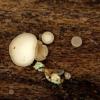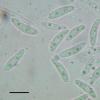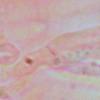
07-02-2026 20:30
 Robin Isaksson
Robin Isaksson
Hi!Anyone that have this one and can sen it to me?

25-01-2026 23:23
Hello! I found this species that resembles Delitsc

05-02-2026 15:07
Found on a fallen needle of Pinus halepensis, diam

05-02-2026 06:43
Stefan BlaserHello everybody, Any help on this one would be mu

18-08-2025 15:07
 Lothar Krieglsteiner
Lothar Krieglsteiner
.. 20.7.25, in subarctic habital. The liverwort i

02-02-2026 21:46
Margot en Geert VullingsOn a barkless poplar branch, we found hairy discs

02-02-2026 14:55
 Andgelo Mombert
Andgelo Mombert
Bonjour,Sur thalle de Lobaria pulmonaria.Conidiome

02-02-2026 14:33
 Andgelo Mombert
Andgelo Mombert
Bonjour,Sur le thalle de Peltigera praetextata, ne
Hymenoscyphus
Nicolas VAN VOOREN,
28-09-2019 10:32
 Hello.
Hello.Here is a Hymenoscyphus growing on a small dead branch (hardwood), in a wet place.
Excipulum of textura subprismatica, becoming ± a t. subglobulosa at the base, mixed with clavate cells.
Paraphyses without VBs.
Asci without crozier, IKI+ (bb)
Spores 13-16 × (3.2) 3.5-4 µm
Any suggestion?
Hans-Otto Baral,
28-09-2019 10:39

Re : Hymenoscyphus
Hi Nicolas
with this spore characters I the absence of VBs and croziers sounds strange. Can you give photos of them? The apothecia are completely stalkless? What diameter?
with this spore characters I the absence of VBs and croziers sounds strange. Can you give photos of them? The apothecia are completely stalkless? What diameter?
Nicolas VAN VOOREN,
28-09-2019 10:42

Re : Hymenoscyphus
Thanks Zotto for your reply. I'm going to make a new prep, now the specimens are dried.
Apothecia are very short-stalked, reaching 1.5 mm diam.
Apothecia are very short-stalked, reaching 1.5 mm diam.
Hans-Otto Baral,
28-09-2019 15:36

Re : Hymenoscyphus
No doubt! That could point to Ph. fulvidulum which is usually dark-coloured, but when there were no VBs in the living paraphyses, then this is ruled out.



